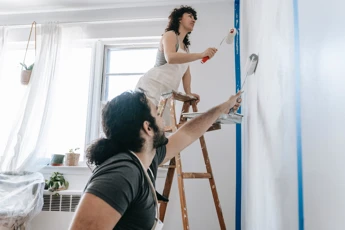 Written by: Danny Belton - Head of Lending
Written by: Danny Belton - Head of Lending
If you've had a mortgage that you’ve been diligently paying for some time, you may have asked yourself: can I remortgage my house to buy a second property?
How do you like the sound of a holiday home in your favourite destination, or perhaps a buy-to-let investment to bring in some extra money? Now could be the ideal opportunity to remortgage your house and use the equity to purchase another property.
Can I remortgage my house to buy another property?
Remortgaging your house to buy a second property is certainly an option.
Here are three factors that a lender has to take into consideration when deciding whether to loan you the money:
1. The use of second property
Tell your mortgage adviser about your plans for remortgaging your house to buy a second property is crucial. This allows them to tailor advice to your specific situation, ensuring that you take the most suitable route to becoming a homeowner for a second time.
Here are some of the types of second properties if you’re thinking about remortgaging your house:
Second home/holiday home
Buying a second home and having somewhere to escape to for some rest and relaxation can be very beneficial. However, you need to have a considerable budget in place to ensure you can afford the mortgage payments and associated costs of two properties.
Remember, you'll be responsible for maintaining two properties, which can be time-consuming and expensive, especially if the second home is far away.
Buy-to-let
Whether you’re a new landlord or want to expand your current portfolio, you could buy another property to rent out. Unlike regular mortgages, you'll need a buy-to-let mortgage specifically designed for investment properties. These typically require a larger deposit and may have higher interest rates.
Owning a buy-to-let property involves managing tenants, ensuring property upkeep, and adhering to landlord regulations, so consider hiring a letting agent to handle these aspects for a fee.
Let-to-buy
This approach involves renting out your current home and using the rental income to purchase a new property to live in. You'll need separate mortgages: a let-to-buy mortgage for your current property, and a residential mortgage for the new one.
For a family member
While buying a second home for a loved one can be a generous act, careful planning is crucial. Have open discussions about expectations - rent, upkeep responsibilities, and the long-term plan for the property. Next, secure financing that considers your budget and the investment aspect.
Remember, you'll be legally responsible for the mortgage of this property, so ensure your finances are secure. You should consider creating a formal lease agreement outlining the terms of occupancy and responsibilities for both parties to protect yourself and avoid future complications.
This includes the equity in your home, your current financial situation and affordability, your employment status, the reason you’re purchasing the second property and even the type of remortgage you’re applying for.
Try out our remortgage rate finder for an idea of what the repayments could be.
Remortgage rate finder
Our mortgage finder searches thousands of deals, so you can rest assured we'll always find the right one for you.
2. Your affordability
Releasing equity in your house to buy another property can potentially lead to higher monthly repayments. You'll also need to pass affordability checks to ensure your current income can comfortably handle these increased costs, as well as factoring in remortgaging fees.
Remember, missing mortgage repayments could result in losing both properties, so it’s important that you’re honest with your mortgage adviser about your financial position.
3. Your employment status
If you’re self-employed you may have a few concerns about remortgaging. Your mortgage adviser will offer their expert opinion and guide you through the remortgage process from start to finish.
They'll look at your financial situation, including your current income and any outgoings, and will clearly explain your options so you can make a decision that’s right for you. In the meantime, you might want to read our dedicated article on remortgaging when you’re self-employed.
What are your options to finance a second home?
There are a few different ways you can finance buying a second property.
Releasing equity
If you’ve built up equity in your home over the years, then you may even have enough to buy a second property outright. This means you’d only have one mortgage on your original house.
Second mortgage
You might be able to release equity from your current home to put down as a deposit on a second property, and take out a mortgage to pay for the rest. This means you’d have two mortgages.
Get expert mortgage advice
No matter where you are in your homebuying process, we’re on hand to help you achieve your dreams of homeownership.
Get in touch with us today and let’s discuss your options.
We can help you assess your affordability, highlight suitable incentive schemes, and get the ball rolling on securing a mortgage.
Frequently asked questions
There are restrictions on how soon you can remortgage a Right to Buy property. In most cases, you'll have to wait until the pre-emption period ends before you can freely remortgage with any lender. Speak to your mortgage broker for more information if this applies to you.
No, you can't directly use your house itself as a deposit for another house. However, you can leverage the equity you've built up in your current home to indirectly act as a deposit for a new property. There are two main ways to achieve this - remortgaging your house or selling it.
The exact time it takes for a remortgage application to be approved can vary, and is dependent on a number of factors:
-
Ensure you've submitted all necessary documents upfront to avoid delays
-
A solid financial history with a strong credit score can help expedite the process
-
The time it takes to arrange and complete a valuation on the property can impact the overall timeline
-
Different lenders may have slightly varying internal processing times.
It's always best to check with the specific lender you're interested in for their estimated turnaround time. Our mortgage advisers will also be able to help.
The exact amount depends on many factors, such as your age and the value of your property. If equity release is an option you're considering, it's always helpful to contact an adviser to discuss this in more detail.
Taking equity out of your existing property is a common strategy for those remortgaging to buy a second property. By remortgaging, you can essentially replace your existing mortgage with a new one for a larger amount. The difference between the new loan amount and what you still owe on your current mortgage becomes the equity you can access. These funds can then be used as a deposit on another property.
While there is no universal upper age limit for mortgage applications, each lender has their own set of rules - whether that’s a maximum age limit at the time of application or the end of the mortgage term, or a requirement to prove affordability for the full length of the mortgage term.
The latter naturally becomes more challenging when your income reduces considerably as a result of retirement, but there are options available to you. A mortgage adviser will be able to save you a lot of time by helping you to identify which lenders will consider your application at this age.
Read our guide for remortgaging over the age of 60.
Related Articles
How to remortgage: our top 7 tips
Should you use extra money to pay off your mortgage early?
Can I change the term of my mortgage?
Getting ready to remortgage
Home improve or move?
How to remortgage if you're self-employed
Important information
You may have to pay an early repayment charge to your existing lender if you remortgage.
Your home may be repossessed if you do not keep up repayments on your mortgage.
There may be a fee for mortgage advice. The actual amount you pay will depend on your circumstances. The fee is up to 1% but a typical fee is 0.3% of the amount borrowed.
There is no guarantee that it will be possible to arrange continuous letting of the property, nor that rental income will be sufficient to meet the cost of the mortgage.







